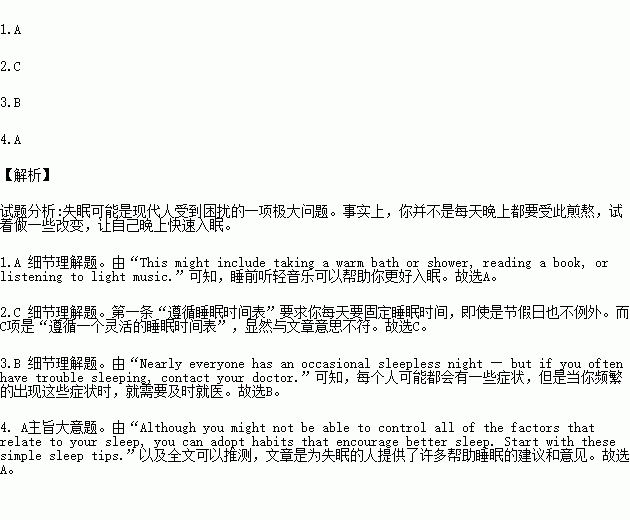题目内容
You're not doomed to toss and turn every night. Although you might not be able to control all of the factors that relate to your sleep, you can adopt habits that encourage better sleep. Start with these simple sleep tips.
No. 1: Stick to a sleep schedule
Go to bed and get up at the same time every day, even on weekends, holidays and days off. Being consistent reinforces (加强) your body's sleep-wake cycle and helps promote better sleep at night. If you don't fall asleep within about 15 minutes, get up and do something relaxing. Go back to bed when you're tired.
No. 2: Pay attention to what you eat and drink
Don't go to bed either hungry or stuffed. Your discomfort might keep you up. Also limit how much you drink before bed, to prevent disruptive middle-of-the-night trips to the toilet. Nicotine, caffeine and alcohol deserve caution, too. The stimulating effects of nicotine and caffeine — which take hours to wear off — can ruin quality sleep.
No. 3: Create a bedtime ritual
Do the same things each night to tell your body it's time to wind down. This might include taking a warm bath or shower, reading a book, or listening to light music. Be careful of using the TV or other electronic devices as part of your bedtime ritual. Some research suggests that screen time or other media use before bedtime has impact on sleep.
No. 4: Get comfortable
Create a room that's ideal for sleeping. Often, this means cool, dark and quiet. Consider using room-darkening shades, earplugs, a fan or other devices to create an environment that suits your needs.
Your mattress and pillow can contribute to better sleep, too. Since the features of good bedding are subjective, choose what feels most comfortable to you. If you have children or pets, set limits on how often they sleep with you — or insist on separate sleeping quarters.
No. 5: Limit daytime naps
Long daytime naps can affect nighttime sleep — especially if you're struggling with poor sleep quality at night. If you choose to nap during the day, limit yourself to about 10 to 30 minutes and make it during the mid-afternoon.
If you work nights, you'll need to make an exception to the rules about daytime sleeping. In this case, keep your window coverings closed so that sunlight — which adjusts your internal clock — doesn't interrupt your daytime sleep.
No. 6: Include physical activity in your daily routine
Regular physical activity can promote better sleep, helping you to fall asleep faster and to enjoy deeper sleep. Timing is important, though. If you exercise too close to bedtime, you might be too energized to fall asleep. If this seems to be an issue for you, exercise earlier in the day.
No. 7: Manage stress
When you have too much to do — and too much to think about — your sleep is likely to suffer. To help restore peace to your life, consider healthy ways to manage stress. Start with the basics, such as getting organized, setting priorities and dividing tasks. Give yourself permission to take a break when you need one. Share a good laugh with an old friend.
Nearly everyone has an occasional sleepless night — but if you often have trouble sleeping, contact your doctor. Identifying and treating any underlying causes can help you get the better sleep you deserve.
1.Which of the following is helpful to have quality sleep at night?
A. listening to light music before bed
B. working out in the gym only in the day time
C. using expensive pillows that sell well
D. drinking lots of water instead of coffee before bed
2. Which of the following sleep tips is not mentioned in the passage?
A. Control your daytime sleep time.
B. Adopt healthy ways to handle stress.
C. Follow a flexible sleep timetable.
D. Schedule your daily physical activities.
3.According to the passage, in what situation do you need to contact your doctor?
A. You can not nap in the day time.
B. You frequently have trouble sleeping.
C. You do not fall asleep within 15 minutes.
D. You have too much to think about before bed.
4.What’s the purpose of this passage?
A. To provide advice on promoting better sleep at night.
B. To inform readers of different sleep habits before bed.
C. To offer tips on various relaxing activities before bed.
D. To convince readers of the importance of quality sleep at night.
 星级口算天天练系列答案
星级口算天天练系列答案 芒果教辅达标测试卷系列答案
芒果教辅达标测试卷系列答案
